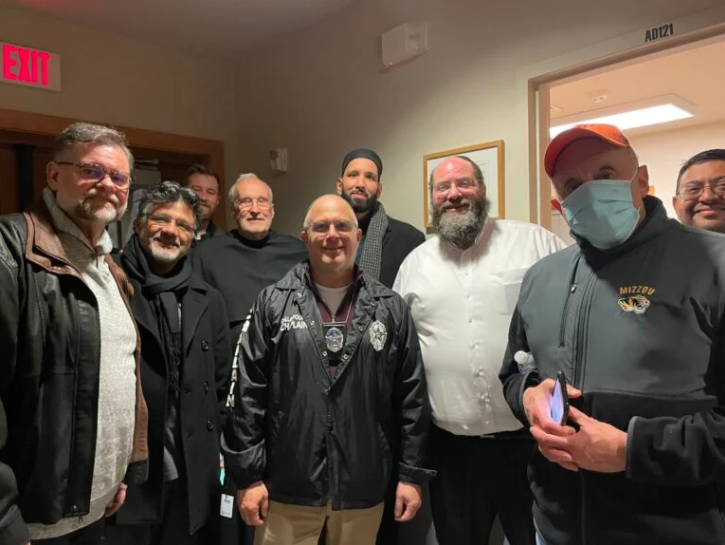As rabbi was held hostage, his interfaith clergy colleagues gathered to help end the standoff

(RNS) — If there's a word that comes up repeatedly when friends discuss Rabbi Charlie Cytron-Walker, the rabbi who was taken hostage with three others at his Reform synagogue Saturday (Jan. 15), it's "kind."
"Kind doesn't begin to cover it," said Lindsey Weiss, who attended Congregation Beth Israel in Colleyville, Texas, since she was 11. "He's the nicest guy."
But it wasn't kindness alone that may have helped Cytron-Walker defuse a tense 11-hour standoff with a gunman who said he brought explosives to the synagogue. The rabbi, who has led the Reform synagogue of about 125 families since 2006, is also an interfaith champion with deep-rooted friendships not only among Christians but Muslims, too.
Those friendships were evident in the command center set up at Good Shepherd Catholic Community nearby, where a group of rabbis, imams and pastors helped FBI teams negotiate with the hostage-taker.
The team included Bob Roberts Jr., pastor of Northwood Church in nearby Keller and co-founder of the Multi-Faith Neighbors Network; Imam Omar Suleiman, president of Yaqeen Institute for Islamic Research and a columnist at Religion News Service; Azhar Azeez, a former president of the Islamic Society of North America; and Rabbi Andrew Marc Paley of Temple Shalom in Dallas.
"There's probably no one who can handle it better than (Cytron-Walker) because he gets a bigger picture than just his own tribe," said Roberts, who has known Cytron-Walker for 15 years. "That's how he lived his life in the public square — committed to his own faith but respectful of other people's faiths."
Late Saturday, an FBI SWAT team breached the synagogue, killing the hostage-taker and freeing three of the people inside — a fourth person, an elderly man, had been released around 5 p.m. The suspect was identified as Malik Faisal Akram, a British citizen.
The incident was the latest to rock American Jews, many still scarred by a string of violent attacks at synagogues beginning with the massacre of 11 Jews at the Tree of Life Synagogue in Pittsburgh in 2018.
It's unclear why the hostage-taker chose Congregation Beth Israel, located between Dallas and Fort Worth in a suburb with expensive homes and good schools. He apparently entered the synagogue as members were livestreaming Shabbat services. Akram could be heard ranting on the livestream before it abruptly cut off. The intruder was also heard demanding the release of a Pakistani neuroscientist who was convicted of trying to kill U.S. Army officers in Afghanistan.
But Dallas-area Muslim community leaders took pains to dispel any notion that the synagogue was targeted because of any antipathy toward Islam.
"None of us are going to fall for the more nefarious narrative spun as a result of this," said Suleiman, referring to those who viewed the incident as portending hatred between Muslims and Jews.
"The rabbi and his family and the congregation understood right away that it wasn't the Muslim community that was attacking them. It was the Muslim community that was supporting them," Suleiman said. "This attacker was acting alone."
When Adena Cytron-Walker, the rabbi's wife, arrived at the command center set up at the Catholic church, she was warmly embraced by members of the Muslim community.
Adena Cytron-Walker has been her husband's partner on interfaith work. She is vice president of programs at the Multicultural Alliance, a Fort Worth organization that works toward "understanding and respect among all races, religions, and cultures through advocacy, conflict resolution, and education."
Friends described the couple as deeply committed to social justice on a range of issues, most especially interfaith relations.
One of those close friends, a Pakistani American, brought Rabbi Cytron-Walker's favorite food to the church — samosas, according to Suleiman.
That's not to say Jewish, Muslim and Christian relations are perfect in the larger Dallas-Fort Worth area, said Rabbi Nancy Kasten, chief relationship officer at Faith Commons, an interfaith organization in Dallas.
"There's not a lot of knowledge about Jews in the greater population and Muslims are at best mysterious and unfortunately feared and distrusted," Kasten said. "There are certain nexuses where people come together to do great interfaith work. I hope this incident will be an opportunity to deepen and broaden relationships between faith communities."
But the small synagogue led by Cytron-Walker was one that actively worked to improve relations among different faiths.
Friends of the rabbi and his wife, who met at the University of Michigan when they were both undergraduates there, say they were committed to "tikkun olam," a Jewish phrase translated as "repairing the world." The two were also champions of LGBTQ rights.
Charlie Cytron-Walker was long expected to be a leader in the Reform Jewish movement. As a teen he attended Kutz Camp in Warwick, New York, a training ground for Jewish youth interested in leadership roles in the Reform movement. (The camp has since closed.)
Cytron-Walker was on board of the Reform Jewish Youth Movement, representing Michigan, his home state, said Rabbi Emily Losben-Ostrov, who met him at the camp and later studied alongside him at rabbinical school.
"He would always say things like, 'That's swell,'" said Losben-Ostrov, rabbi at Temple of Israel in Wilmington, North Carolina. "He was funny and sweet. He is very smart, down-to-earth and would never make anyone feel less-than. He's an ally in every sense of the word, for every community."
On Sunday Cytron-Walker posted to Facebook: "I am thankful and filled with appreciation for
All of the vigils and prayers and love and support,
All of the law enforcement and first responders who cared for us,
All of the security training that helped save us."
© Religion News Service











